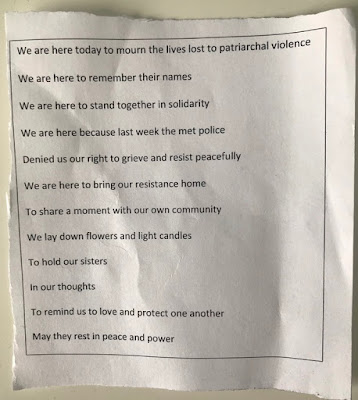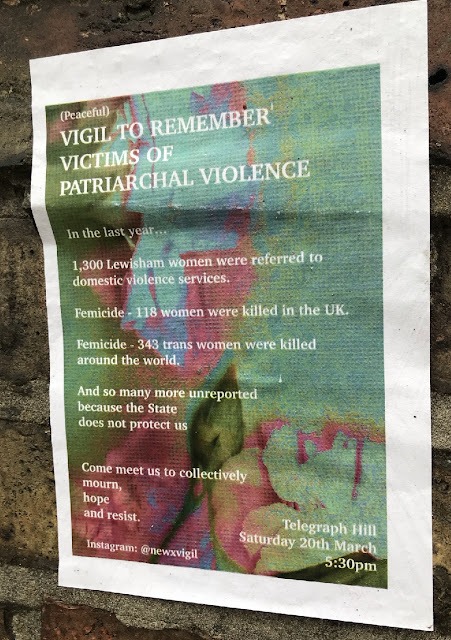If you haven't been down Arklow Road for a while you might be in for a surprize, the new Anthology Deptford Foundry housing development is complete and lived in with little trace of the former industrial landscape.
A statue on site of a human figure with propellors hints at its former use as the location for J. Stone and Co’s Brass, Copper and Iron Works, Deptford.
The company had its origins in an engineering workshop on Deptford High Street started by Josiah Stone (1803-1867) to make copper nails and rivets used in shipbuilding. Going into business with George Preston and John Prestige as J. Stone & Co., the company operated out of railway arches by Deptford station from 1842 until 1881 when it moved to its new built factory on Arklow Road.
 |
Stone's factory in Arklow Road, SE14 in 1885
|
By the start of the First World War, Stone's had 1,350 workers and was making propellors for the Royal Navy as well as other metal items for ships. In World War Two it made more than 2,200 propellors for the Royal Navy, and at its peak in the 1950s expanded further with 4,000 staff spread between its Deptford site and another in Woolwich Road, Charlton. Like much local industry though it was to decline through the 1960s and the Arklow Road factory closed in 1969. Incidentally, comedian Spike Milligan worked at Stone's in Deptford in the 1930s.
Most of the site has been redeveloped, but there is though an original building remaining at 28 Arklow Road, albeit it in very poor condition. This was most recently known as SAFA House but was originally known as the Welcome Institute, sometimes referred to as the Welcome Coffee Tavern and Institute (Kentish Mercury, 6/4/1894). Opening in 1890, it catered primarily for the Stone's workers and comprised ‘a concert room and gymnasium, a reading room and library, a coffee bar and two dining rooms’ (The Engineer, 26 February 1892).

The Stone's workers had a wide social and cultural life. There were Welcome Institute cricket and football teams, draughts and chess clubs, and a swimming club who swam at the baths in Laurie Grove SE14 (Kentish Independent, 21/9/06). A Welcome Institute Athletic Club held a very healthy sounding 'smoking concert' there in 1904 with 'several scientific wrestling bouts':
 |
|
A Welcome Institute Rowing Club was out on the Thames by 1890, though it seems to have faltered by 1895 when former members set up a new Deptford Albion Rowing Club (Sporting Life, 17/4/1895). However the Welcome Institute Rowing Club 'composed chiefly of the employees past and present of Messrs Stone's Engineering Works, Deptford' was relaunched in 1901 (S.Life, 21/8/1901). This was the ancestor of the still thriving Greenwich-based Globe Rowing Club, which started out as the Stone's Rowing Club before moving to the Lord Clyde pub (when it became the Clyde Rowing Club) then the Globe pub in Greenwich where it assumed its current name.
 |
| Welcome Institute Rowing Club race from Limehouse Pier to Greenwich, 1891 |
There was a W.I. brass band, flower shows and a debating society. The venue was used for wider community initiatives too. New Cross and Deptford Amateur Gardeners Society met there (KM, 3/2/1893) and a concert and meeting was held there to establish New Cross and Deptford People's Co-operative Society (KM 7/12/1894).
In the 1920s, the building was bought by Lady Florence Pelham-Clinton and renamed Florence House as part of her charitable work in the area. Lady Florence, who lived at 38 Wickham Road (Pall Mall Gazette, 7/10/20) had originally been involved with the Deptford Fund and Albany Institute, but split away after a disagreement to establish the Lady Florence Institute which as well as the site on Arklow Road also had premises on Deptford Broadway (today home to the 999 club). The Institute's use of the building seems to have come to an end in the 1970s.
In the 1980s it became an African Caribbean club and boxing gym. A former attendee recalls 'I use to go there all the time. It was a small community centre in the week with a pool table and on Friday and Saturday night it was a music venue. It was just called simply 'Arklow Road' (I have also seen it referred to as Arklow Road community centre). It was known for its weekend reggae/dub sessions; Jamaican artist Nitty Gritty performed there once but there was plenty of local sound system talent from Saxon, Ghetto Tone and Jah Shaka (I assume that the footage on youtube and elsewhere of Shaka playing in Arklow Road in 1986 was filmed here, though he also played in other nearby spaces). On the sleevenotes to the Young Disciples 'Road to Freedom' album in 1991, the producer Demus (Dilip Harris) gives thanks to 'the Dub Basket (Arklow Road)' so wonder if that was a name used for club nights.
In the early 1990s the then empty building was squatted by people including the Conscious Collective, a group who put on free parties/raves and gigs. According to Deptford historian Jess Steele 'They cleared the building out, re-decorated, re-plumbed, re-wired, re-glazed, patched the roof and installed a coffee bar. The group of performers, clowns, jesters, bands and dancers ran arts workshops, provided rehearsal space for local groups and organised a series of performance events' (Turning the Tide: the history of everyday Deptford, 1993). The squat was known as Lady Flo's. The great 90s+ gigs, squats and parties site has a flyer for a Co-Creators gig there and for the 'Flo's Farewell' Eviction Party in April 1992. According to an article about the Collective by Camilla Berens, 'On the day of the eviction from Lady Flo's the Collective held an impromptu street party outside the building. A bemused bailiff was greeted with tribal rhythms emanating from drums, bongos and a grand piano' (Independent, 30 July 1992). The Collective had tried to negotiate a deal to stay with Lewisham Council who by then owned the building, but the Council sold it off and its 100 year history as a social/cultural/sporting venue more or less came to an end.
The Conscious Collective moved on to squat 'The Canteen' for a while, formerly the canteen for Deptford power station workers and they were also one of the groups responsible for the 1990s Deptford Urban Free Festival which attracted tens of thousands of people to Fordham Park in New Cross.
Since those days the increasingly derelict building seems to have been largely used for storage though it was squatted for a while recently by 'a collective who value the building's history and aim to continue its use as a community resource'. They hosted a Radical Film Network film screening there in October 2019.
Scott Barkwith from Deptford Folk took a look inside a couple of year ago and it was a bit of a mess. There were still some posters on the wall for local events, including this one for a 1991 gig at the (now closed)
Pilot pub at 174 Deptford High Street featuring 'The Sea' (another Deptford Urban Free Festival favourite):
The building was sold in 2017 and Murky Depths reports that planning permission was granted in 2018 for the conversion of the building into flats, or more precisely for the frontage of the building to be retained wrapped round new build housing with the remainder demolished, possibly with a coffee shop on the ground floor. That would be some kind of return to original usage, though a long way from the engineers' social club of 100 years ago.
There's still a lot more to be told about SAFA House I am sure. For a start does anybody know what SAFA stands for? Would also like to know more about what went on there during the Lady Florence Institute period (1930s-1970s?). Stone's deposited extensive papers with Lewisham archives when the factory closed, and there is information held there about the Welcome Institute that would no doubt be worth checking out.
[There's some historical detail on building in archaeology survey for planning application]












































